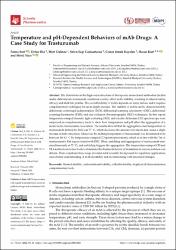| dc.contributor.author | Sert, Fatma | |
| dc.contributor.author | Hız, Defne | |
| dc.contributor.author | Gülmez, Mert | |
| dc.contributor.author | Cankurtaran, Selen Ezgi | |
| dc.contributor.author | Kayalan, Cemre Irmak | |
| dc.contributor.author | Kurt, Hasan | |
| dc.contributor.author | Yüce, Meral | |
| dc.date.accessioned | 2022-04-14T07:23:50Z | |
| dc.date.available | 2022-04-14T07:23:50Z | |
| dc.date.issued | 2022 | en_US |
| dc.identifier.citation | Sert, F., Hız, D., Gülmez, M., Cankurtaran, S. E., Kayalan, C. I., Kurt, H. ... Yüce, M. (2022). Temperature and pH-dependent behaviors of mAb drugs: A case study for trastuzumab. Scientia Pharmaceutica, 90(1). https://doi.org/10.3390/scipharm90010021 | en_US |
| dc.identifier.issn | 2218-0532 | |
| dc.identifier.uri | https://doi.org/10.3390/scipharm90010021 | |
| dc.identifier.uri | https://hdl.handle.net/20.500.12511/9334 | |
| dc.description.abstract | The distortions in the high-order structure of therapeutic monoclonal antibodies (mAbs) under different environmental conditions acutely affect mAb stability, resulting in altered safety, efficacy, and shelf-life profiles. The overall stability of mAbs depends on many factors, and it requires complementary techniques for an in-depth analysis. The stability of mAbs can be characterized by differential centrifugal sedimentation (DCS), differential scanning calorimetry (DSC), differential scanning fluorimetry (DSF), and size exclusion chromatography (SEC) techniques. In this report, temperature-ramped dynamic light scattering (DLS), and circular dichroism (CD) spectroscopy were employed as complementary tools to show how temperature and pH affect the aggregation of a model mAb, trastuzumab, in solution. The results showed that the aggregation onset temperature of trastuzumab defined by DLS was 75 degrees C, which decreases the amount of beta-sheets and causes a slight increase in helix structures. Moreover, the melting temperature of trastuzumab was determined to be between 80-83 degrees C by temperature-ramped CD spectrophotometry, which is in line with the Tm of trastuzumab's Fab region tested with DSC. Thus, unfolding and aggregation of trastuzumab start simultaneously at 75 degrees C, and unfolding triggers the aggregation. The temperature-ramped CD and DLS methods are robust tools to determine the thermal behavior of biosimilars in various solution conditions. Their complementary usage provides solid scientific background for regulatory applications and a better understanding of mAb instability and its relationship with structural changes. | en_US |
| dc.language.iso | eng | en_US |
| dc.publisher | MDPI | en_US |
| dc.rights | info:eu-repo/semantics/openAccess | en_US |
| dc.rights | Attribution 4.0 International | * |
| dc.rights | https://creativecommons.org/licenses/by/4.0/ | * |
| dc.subject | Thermal Stability | en_US |
| dc.subject | Conformational Stability | en_US |
| dc.subject | Colloidal Stability | en_US |
| dc.subject | Biophysical Characterization | en_US |
| dc.subject | Complementary Tools | en_US |
| dc.title | Temperature and pH-dependent behaviors of mAb drugs: A case study for trastuzumab | en_US |
| dc.type | article | en_US |
| dc.relation.ispartof | Scientia Pharmaceutica | en_US |
| dc.department | İstanbul Medipol Üniversitesi, Mühendislik ve Doğa Bilimleri Fakültesi, Biyomedikal Mühendisliği Bölümü | en_US |
| dc.department | İstanbul Medipol Üniversitesi, Rektörlük, Sağlık Bilim ve Teknolojileri Araştırma Enstitüsü | en_US |
| dc.authorid | 0000-0002-1677-644X | en_US |
| dc.identifier.volume | 90 | en_US |
| dc.identifier.issue | 1 | en_US |
| dc.relation.tubitak | info:eu-repo/grantAgreement/TUBITAK/SOBAG/2244 | |
| dc.relation.publicationcategory | Makale - Uluslararası Hakemli Dergi - Kurum Öğretim Elemanı | en_US |
| dc.identifier.doi | 10.3390/scipharm90010021 | en_US |
| dc.institutionauthor | Kurt, Hasan | |
| dc.identifier.wos | 000774348500001 | en_US |
| dc.identifier.scopus | 2-s2.0-85128075251 | en_US |
| dc.identifier.scopusquality | Q2 | en_US |


















